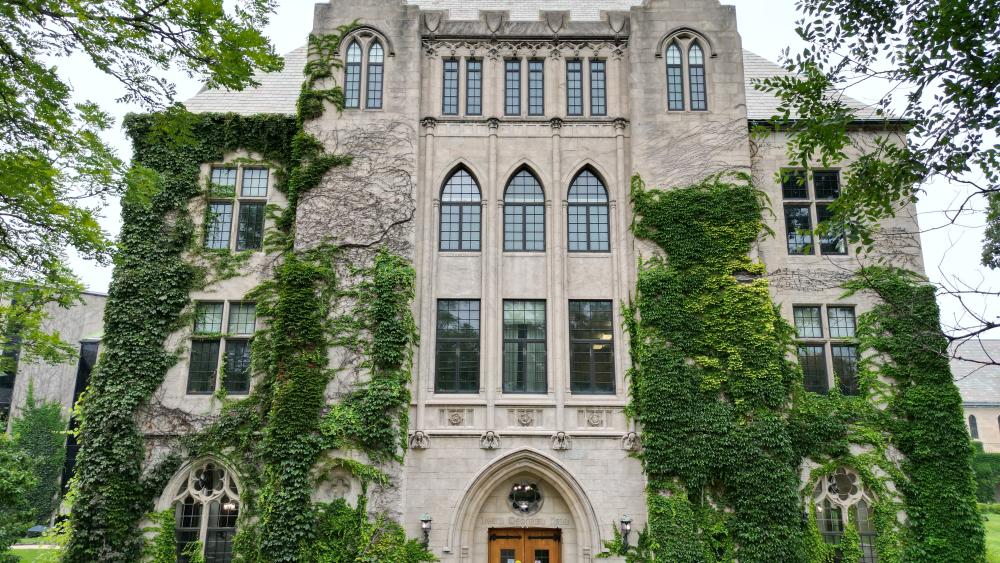Dominican University’s New Emmaus Ecology Initiative Looks to Activate Young People in Catholic Parishes

River Forest, IL — A new initiative from Dominican University aims to revive Catholic congregations by reaching—and igniting the spirits of—youth and young adults.
A $1.25 million grant from Lilly Endowment Inc,. through its Thriving Congregations Initiative will enable Dominican’s Office of University Ministry and its Theology and Education Departments to build the Emmaus Ecology program, a community-based support system to nurture the spiritual lives of young people and elevate them as leaders in their parishes. This will be done by leveraging resources and relationships to connect youth ministries, Catholic schools, and parishes—particularly those serving historically marginalized communities.
“Emmaus is a story of disillusioned disciples as they walk away from the Church—a story which mirrors the lived experience of so many young people today,” said Dr. Clodagh Weldon, professor of theology and co-interim vice president of Mission and Ministry at Dominican University. “It is also a story of encounter and accompaniment, a story of the risen Jesus who dares to ask them, ‘What are you talking about?’ That is ultimately what this project is all about.”
In partnership with the Archdiocese of Chicago and in collaboration with local, regional and national partners, the program will reach beyond Dominican students as it also works to engage young people from outside the university community and encourage greater faith-based involvement—setting a foundation for others to follow in Dominican’s mission of creating a more just and humane world.
The program is slated to launch in January.
“Ultimately, we envision a robust ecosystem where youth-facing practitioners and congregations have the skills, resources, and confidence to effectively accompany young people throughout their faith journeys along a continuum of developmentally and culturally appropriate engagement opportunities,” said Tara Segal, director of University Ministry and co-interim vice president of Mission and Ministry at Dominican University.
Specific initiatives within the Emmaus Ecology include:
• Establishing and investing in regional youth ministries on the southwest side and in the near western suburbs to serve as bridges between parishes and schools and coordinate activities and high-quality programs like retreats, peer leadership formation, and praise and worship nights.
• Increasing formation and professional development opportunities for Catholic school teachers, offering accompaniment, instruction, and pedagogical strategies for teaching religion. Partnering with the Office of Catholic Schools, faculty from Dominican will facilitate sessions for all new and early career teachers in the Archdiocese. This continues and builds on work that Dominican professors have been engaged in with the Archdiocese this past year.
“It’s been a deeply rewarding experience to work with new teachers who are so engaged and committed to serving young people and helping them thrive,” said Weldon. “This grant will allow us to continue to accompany these teachers and to build resources, competencies and structures of support.”
• Convening small groups of pastors and parish staff to discuss challenges, brainstorm new ideas for their parishes, and reflect on their roles and practices.
“The ultimate goal of this is to help the parishes become more youth-centric,” explained Elizabeth Young, advancement and communications coordinator for Mission and Ministry. “We often hear from young people that they don't feel welcome, their contributions are overlooked, or religion isn't relevant to their daily lives. We also understand that pastors trying to address this may feel alone or overwhelmed. This grant will allow us to create intentional spaces for professional ministers to explore the minds and hearts of the young people they serve and to contemplate creatively—together—the future of youth ministry and leadership in their congregations.”
"I have been continually impressed by Dominican’s commitment to the communities they serve ... as well as their utilization of culturally responsive practices that center the lived realities and traditions of young people and their families," said Melissa Link, director of Catholic Mission and Culture for the Archdiocese of Chicago Office of Catholic Schools. "As a smaller Catholic institution, Dominican has the agility to work with individual schools, parishes, and partners in a highly innovative and collaborative way."
In a letter of support to Lilly Endowment, Cardinal Blase Cupich noted the importance of collaboration in re-envisioning and renewing parishes.
“I am grateful for Dominican University’s passionate and proactive spirit in cultivating relationships and making investments that will help our parishes and schools to meet the challenges of our new missionary age,” Cupich wrote.
Among other supporters of the program’s concept was the late Bishop Kevin Birmingham who championed its creation and brought the proposal to the attention of Cardinal Cupich.
“He believed in us. And he encouraged us—lay people—to do this work,” Weldon said.
About Dominican University
Founded in 1901, Dominican University is a comprehensive, coeducational Catholic institution offering bachelor’s and master’s degrees through the Rosary College of Arts and Sciences, the Borra College of Health Sciences, the Brennan School of Business and the College of Applied Social Sciences. The university also offers doctoral degrees in information studies and applied social justice. U.S. News & World Report ranks Dominican University #11 out of all Midwest regional master’s level universities, #1 in the Midwest for Best Value and #1 in Illinois for innovation and ensuring the social mobility of its graduates.